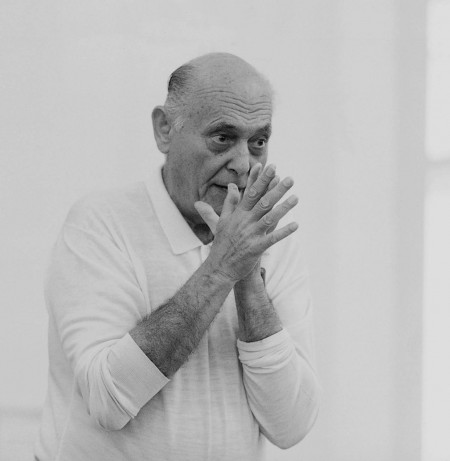
21 October 1912, Budapest – 6 September 1997, Antibes
György Solti, a significant conductor-personality of the second half of the 20th century began his studies at the Academy of Music in Budapest as a pianist in the class of Arnold Székely (later he was also a student of Bartók and Dohnányi for a shorter period of time), then completed the composition major with the guidance of Albert Siklós. ‘The training was difficult and occasionally fairly hard: the one who carried through it got out of there as a real musician. I have learned the basics of discipline and hard work during the time I spent at the Academy…' – as he wrote in his autobiographical book (Emlékeim [My Remembrances], Seneca Kiadó, 1998). Although Leó Weiner his chamber music professor had the greatest influence on him: ‘I can not emphasize enough my gratefulness to him. He was a wonderful, natural musician and an absolute professional at the same time who had comprehensive and deep knowledge of the art of music making… He taught how to listen to each other when playing in an orchestra… how to recognize when to follow and when to lead… how to hear and judge what is happening in the orchestra and how to notice and correct the mistakes… I am not exaggerating when I say: I thank everything I achieved as a musician to Leó Weiner.'
He became a coach at the Budapest Opera after completing his studies at the Academy. His extraordinary talent gained attention at that time already: ‘Although there is not a conductor's baton in his hand yet, he proved that he as a soldier is carrying a marshals baton in his knapsack by coaching the Khovanschina .' (István Péterfi, Magyar Hírlap, December 30, 1936.) A new significant experience was for him that he could work as an assistant to Toscanini at the Salzburg Festspiele in 1936. He conducted his first opera performance the Le Nozze di Figaro in Budapest in 1938 and made his debut the same year at the concert stage as well. Aladár Tóth wrote about that evening as: '....the one who can strike up the march of the La gazza ladra with such an irresistible impetus and splendid brio, who is able to hold his orchestra together with such a safe hand, and finds such a vivid, immediate contact with the audience, that is a conductor-talent of the best, the man of a certain career to be reckoned with both at the concert hall and opera house.'
Although the Nazism and the war did not allow the "certain career" to unfold, after the difficult years spent in Switzerland, his career progressed straight: he made his debut in Munich with the Fidelio in 1946 and following that was music director of the Bavarian State Opera between 1946 and 1952.
He made his first recordings in 1947, conducted the first concert with the London Symphony Orchestra in 1949, conducted at the Salzburg (1951) and Edinburgh (1952) festivals, and had been director of the Frankfurt Opera from 1952 and leader of the Covent Garden in London for ten years, from 1961. At this latter position he set the aim to make the Covent Garden to be "simply the best Opera in the world" - in which, according to many – he succeeded. He conducted the English premiere of the Moses und Aron, and the full Ring cycle sounded first by his baton at the Covent Garden as well as the last opera of Richard Strauss, the Die Frau Ohne Schatten
His co-production with the Chicago Symphony Orchestra, lasting for more than two decades, started in 1969. Besides that he led the Orchestre de Paris for a while and conducted a number of other great orchestras of the world as a guest conductor.
He has made lots of recordings during his career. The novel application of the stereo technology was a result of his co-production with producer John Culshaw (first in the Salome) which made the stage surround-effect possible at opera recordings. The culmination of this work was the first recording of the full Ring in the world in 1966. The Decca Company recorded the five great Mozart operas with Solti as a series (with the London Symphony Orchestra), the Mahler symphonies, and the piano concertos of Beethoven with the Chicago Symphony Orchestra. He was an outstanding performer of Bartók works, as well: "If someone wants to get a true picture of Bartók's art of instrumentation, should listen to the Concerto in Solti's interpretation" (review from György Kroó, 1995).
P. J.


